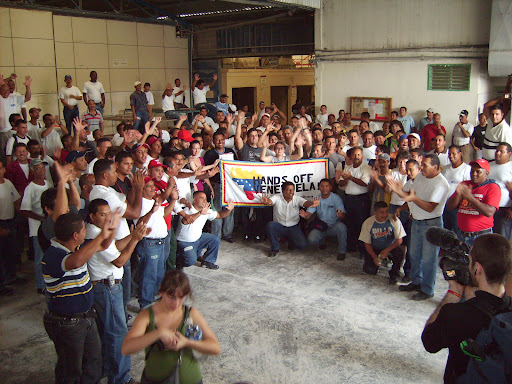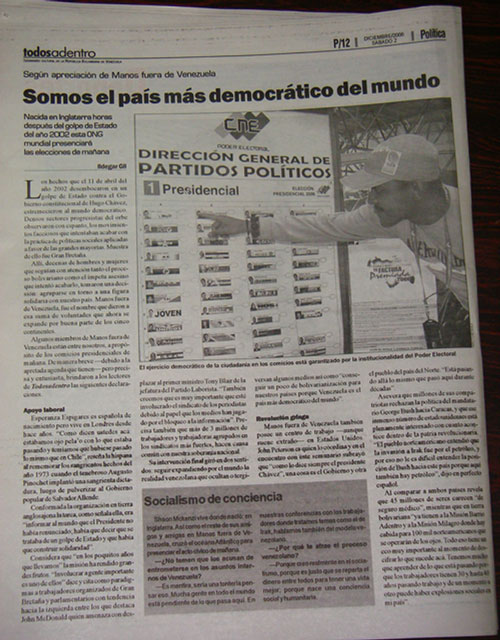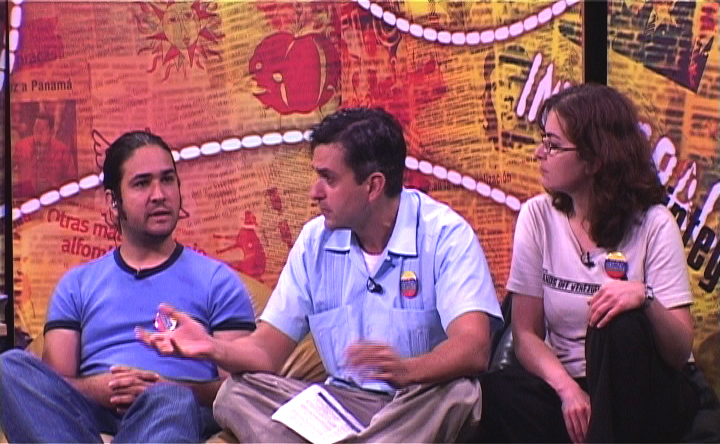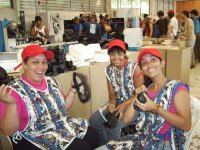Click on the pic below for a link to a photo gallery about the visit of the HOV delegation to Sanitarios Maracay on the 1st of December. Enjoy!

More photo galleries coming soon.
All the best!
Espe Espigares (unfortunately, back in London now!)
The international solidarity campaign Hands Off Venezuela has sent a delegation composed of activists from different countries to Venezuela to observe the December 3rd presidential elections. This is a report of their activities and impressions.









 Our media blitz here has been extensive. From a full-page article in one of the main Caracas newspapers “Ultimas Noticias” to interviews and guest appearances broadcast on Venezuela TV, Catia TV, Vive TV and National Assembly TV which aired from within the heart of the Venezuelan Parliament.
Our media blitz here has been extensive. From a full-page article in one of the main Caracas newspapers “Ultimas Noticias” to interviews and guest appearances broadcast on Venezuela TV, Catia TV, Vive TV and National Assembly TV which aired from within the heart of the Venezuelan Parliament. The host then asked John Peterson from the US delegation what his opinion was about the subject of workers control. He responded by pointing out that it was about nationalization with democratic workers control because workers aren´t interested in defending their work places and factories if they were owned by the boss whose interests are completely at odds with those of the workers. Campesinos won’t defend the land if it is owned by the big landowners and landlords. He used the example of Sanitarios Maracay, a factory occupied and run by the workers as a small scale illustration of how the economy should be run in a socialist state. Assemblies of workers, campesinos, popular and local assemblies organized nationally to run the
The host then asked John Peterson from the US delegation what his opinion was about the subject of workers control. He responded by pointing out that it was about nationalization with democratic workers control because workers aren´t interested in defending their work places and factories if they were owned by the boss whose interests are completely at odds with those of the workers. Campesinos won’t defend the land if it is owned by the big landowners and landlords. He used the example of Sanitarios Maracay, a factory occupied and run by the workers as a small scale illustration of how the economy should be run in a socialist state. Assemblies of workers, campesinos, popular and local assemblies organized nationally to run the12/01/2006
today was a very important day for our delegation, as we got to visit the factory of Sanitarios Maracay, which is occupied and run democratically under workers control.
There is much to report about this, my report can not capture all the aspects and details we were witness to, however I will try to present the general picture of the situation in the factory.
As well there should be video coming online at some point (it may be a short while since we are all very busy preparing for the election, and video work requires quite a lot of work and time. The results will be well worth it, as the footage is the real documentation of a living breathing revolutionary process that could change history)
Sanitarios Maracay, is about an hours drive from Caracas, so to be on time we had to mobilize quite early in the morning. This was made a bit more difficult by the fact that the opposition had been shooting off fireworks and fire crackers starting late the night before and early into the morning (5:30-6am). While there are many Venezuelans using fireworks during normal hours for the Christmas season, which is a very big holiday here. The people we spoke to in the morning said that the fireworks in the early morning were not normal, as well this same tactic was used during the days preceding the referendum. the opposition is completely unwilling to observe democratic methods, the have constantly resorted to dirty tricks. Whether caring out a joint US government coup or pathetically shooting off fire crackers so to steal a night’s rest, these people are intolerant of the will of the people. The best thing that the revolution can do at this point is to take away the social power the opposition, the capitalists hold!
After a drive through the truly beautiful Venezuelan landscape, we arrived at one of many industrial centers in Maracay. The road into the industrial park is met with banners with slogans dealing with workers control “control obrero”, and some spray painting by the workers on some of the walls reading: Workers Turf!
The workers immediately received us and had us quickly exit the bus and enter the grounds of the factory. We were brought into the mess hall and given a briefing of the plan for the tour.
The tour of the rather large facilities, which is encompassed in four separate building divided by intersecting streets, lasted slightly longer than two hours, and was quiet thorough, we thank the workers for their time and efforts in educating us on the process involved in the factory.
The first stop of the tour was very telling of the weight of the situation. This was the beginning of the production process: the raw materials needed to produce the ceramics made there.
The were about 15 or so various powers needed in the production of the ceramics depending on the use of the material. The supplies of the most universal powers were all nearing exhaustion, these are the powders needed to produce any product. As well several other powders that are required in all products were running very low, the workers, however improvised with some materials which could up until a certain point be reused. Unfired pieces that fail to meet quality standards are broken up and put back into the supply of raw material. “When the boss left” we were told, “he left us like this” by the worker giving the tour as he pointed to a nearly empty powder stall. The problem of raw materials in exacerbated since some of the more important powders come from Spain, and the suppliers have so far not been willing to send any more, most likely as a means to end the self run production of the workers. While new suppliers are being sought out there is a pressing need for the factory to be nationalized and keep in good repair and stocked up on all the necessary materials for production.
The worker showing us the factory then brought us to the Silica powder stall, he explained that this power was a carcinogen, and eight to ten years of unprotected exposure can cause cancer. Before the workers formed a union about two years ago (UNT affiliated) the boss had no safety masks for the workers, and the workers were left to the dangers of the carcinogens. Once the union formed the a health committee was set up and at once made demands for more health and safety materials. The workers however had to constantly push for all these necessary items.
In a bit of cleaver working class humor, the kindness of the bosses was on display for all to see. a bit of the old conditions were purposely left untouched, the only drinking facility in the powder storage, chemical testing and mixing building was one small water cooler (that was in disrepair) top off by only one cup ( in the same area as the silica powder!) meant to be used by all 800 workers!
Despite the cruel and inhuman treatment of the workers by the boss, the workers spared no effort to make us feel comfortable and safe at the factory. Several times I saw workers move chains and hooks that we could of run into, and in a huge display of their generosity, the workers, who are on a food rationing system, shared their lunch time meal with us, taking only half a portion of food! The generosity of the workers contrasts heavily with the “generosity” of the bosses!
To this most kind and warm offering of a basic need, one that the workers are running low on and a local food drive has been set up, the International HOV delegates all made a donation to the worker’s fighting fund that provides food for them and their families. We raised over 400,000 Bolivars.
In addition to the workers fighting for their own safety, the expressed their concerns for the local community which is effected by the dust from the factory. the workers plan to research a method of filtering the factory so no dust get blown into the surrounding areas, which house other working facilities and one kindergarten.
We continued to tour the entire process, the molding room, the machine shop, the plaster cast room, the plaster mixers, the chemical testing, the waster filtration system, the design room, areas for processing raw materials, and the giant building filling kiln/oven where the workers gave us a brief lesson in dialectics! They explained the process of heating and cooling, which involves a intentional gradual drop in temperature, which if not used “would cause the material to sharply change, causing a break”.
We saw the entire process of producing sanitary items, toilets, sinks etc, all of which are much needed in this country were millions of people still lack basic housing essentials. This factory provides a use full item that raises the living conditions of real people. I don’t think I need to sell anyone on the need of good working pluming! But this is a great example of the different interests present in society. The workers by occupying the factory are not only saving their jobs and lively hoods of their families, but the living conditions of millions of people. The hostel in which I am lodging in has a sink of the same design which I saw at the factory yesterday. The workers are more than justified in their demand that the factory be nationalized.
We were very fortunate to be able to address the workers of the factory and express of solidarity with them at the end of the trip. Several international HOV delegates involved in workers struggles in their respective countries, got to speak to a general gathering of the hundreds of workers present that day.
The speeches of these delegates should be available soon, hopefully in video format.
I could report more but it is now late and we must wake up early for the election, which will be of a huge importance.
More to come….
In Solidarity
Shane Jones from Caracas






11/30/06
(per the normal busy schedule and spotty Internet service, this report is a day late)
Hey all!,
Well after two very busy and productive days, which were also very hectic, we had a free morning to catch up a bit and get done some necessary errands and other small tasks, as well to make our plans for the next few days.
Around 1pm we made our way through a busy open market and in a very pro-revolution area to the coop Nucleo de Desarrollo Endogeno Fabricio Ojeda, where we were given a guided tour of the various cooperatives.
The site of the coops was once an abandoned filling station and remained as such for twelve years, after the changes introduced by Chavez, the land was taken over by the community and collectively they decided what to do with it. The community collectively makes many social decisions in assemblies here as well.
Since then there have opened up several autonomous cooperatives, the first was a textile coop but soon it was followed by a coop that made shoes, and by an agricultural coop. there is also a construction coop and construction trade school on the site. There is a youth sports coop, and a discount transport ticket center for students that gives prices 70% less than normal. In addition to the various coops there is a state medical center.
The tour of the shoe coop, which only opened a year ago with a state loan using the Micro-credit system has paid of its debt. The coop uses all-Venezuelan materials, such as rubber and leather. The coop has managed to get many large order contracts (10,000 pairs ordered by Cuba) which has helped to reduce over production thus far to non-existence levels, and in general production is very efficient in its use of materials. The shoes produced here are made to last and to be made from inexpensive quality materials. (the styles varied, but all came in black leather)
We spoke to several of the women workers who were working in the quality control department who said “ten million votes for Chavez and long live the world revolution!”
As well many of the workers from all the various coops were not at the facilities today, as half were out working on the election campaign. And many of the workers who were on the “work shift” still at the facilities were wearing Chavez t-shirts and one women worker had a card-board cut out of Chavez’s face at her work bench.
The textile coop was a sea of red! “Rojo Rojito” or as we were told, meaning red all the way through referencing the honest revolutionary spirit of the people as apposed to the phony “red” of the people who act as a break on the revolution. The textile coop had special machinery set up for disabled people who otherwise may not be able to find work, as well there are no old age limitations.
The medical facility was very clean and up to date, it was air conditioned (which is like gold here in a Caracas summer!), and right next door is being build a integrated diagnostics center, which would greatly expand the health services available for the community. As we entered the health center there were only a few people waiting around 3pm, as the doctors told us the busiest time is the morning, the few people waiting were watching a presidential address Chavez was giving on TV. The medical center treats mainly routine ailments but also provides gynecology services and dental care. One dentist told us before the new system of community health centers, dental care was only affordable for the rich, and this left the poor with bad teeth and little work for the dentists, now she said; the poor can have good teeth and the dentists can have regular employment.
We had a pleasant lunch in the agricultural coop, which had a few acres of land to grow food on for the community, which is severed regularly.
One point I would like to make:
While the coop system we visited boosts some very egalitarian aspects (equal pay, community control, worker assemblies plans of production etc) taken as a whole the coop system are not the way forward for the revolution, rather they are only a positive (and in this case very positive) augmentation on the prevailing conditions (a huge informal economy depended on bigger capitalists, terrible work conditions, no community/ worker input etc), also a major point in the coop movement is to produce items that otherwise would be available only by purchasing them from outside the country using oil money. the problem is however that even the most positive augmentation is not a radical change. The coop movement while reducing the dependency on foreign markets, does not actually break the hand of the foreign and native market and the social class that lives by rule of the market: the capitalists. Rather only by expropriating the means of production from the capitalists and running them under democratic workers control can the threat of a counter revolution be put down. The point is not to recreate capitalism based on the barrios but to take the wealth (in the form of necessary industry, needed to keep society functioning) from the 5% on the top and allow all workers, poor and peasants to run production. As long as 5% controls 80% of the wealth of society there is a threat of reaction.
Hopefully tomorrow one if not many delegates can report on the trip to the occupied factory run under workers control we took today, which is the most important part of the struggle currently and show the way forward that is the way to secure and to finish the revolution! (12-1-2006)
In solidarity
Shane Jones from Caracas



